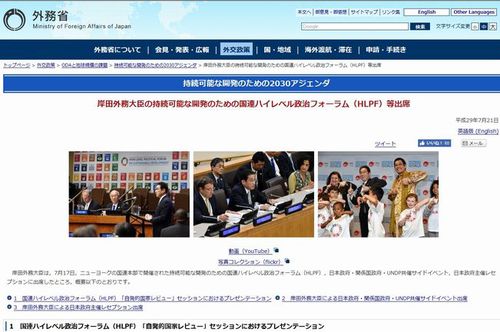November 23, 2017
Japanese NGOs Release Joint Statement on Government's Review of Sustainable Development Goals
Keywords: Policy / Systems

Ministry of Foreign Affairs of Japan website
To report on national progress with the Sustainable Development Goals (SDGs) Japan's Minister for Foreign Affairs attended a Voluntary National Review (VNR) session organized by the High Level Political Platform for Sustainable Development (HLPF) at the UN Headquarters in New York, from July 17 to 19, 2017. On the last day, the non-profit Japan NGO Center for International Cooperation (JANIC) released a joint statement with four other Japanese NGOs to respond to Japan's review. This article covers Japan's report at the VNR session, and the civil society perspective as expressed by JANIC.
The Ministry of Foreign Affairs of Japan announced on July 21, 2017, that Foreign Minister Fumio Kishida had attended the HLPF. At a ministerial meeting there, a VNR session heard Japan's report to the United Nations on national progress with the SDGs.
The minister expressed his country's determination that "by combining the wisdom of various stakeholders including civil society, private enterprises and the government, Japan will take concrete actions both at home and abroad" based on the concept of Public Private Action for Partnership (PPAP) to realize Japan's vision. He emphasized the importance of future generations and noted that Japan would contribute about one billion dollars by 2018 to promote efforts in various sectors, especially children's education, public health, disaster risk reduction, and gender equality. The review also covered Japan's policies and implementation mechanisms.
Responding to the review, JANIC issued a joint statement on July 19 with the following three main comments from the perspective of civil society.
1) Develop Japan's 2030 vision for the SDGs
To integrate SDGs into key national strategies and development cooperation policies, the government should establish SDGs-related budgets, mainstream the SDGs into every sector, and show clear political commitment and leadership.
2) Improve capacity of the SDGs Promotion Headquarters and create frameworks for effective collaboration among government ministries
The government should expand the capacity of the (national) SDGs Promotion Headquarters, establish SDGs divisions or departments within each ministry, and create frameworks to promote inter-ministry collaboration.
3) Promote broad public participation in SDGs implementation
The government should to work to ensure broad participation from many sectors of society, including activities across Japan on the theme of "no one left behind."
JANIC hopes Japan will send out a strong message that it work for the achievement of the SDGs, with a special focus on youth and women, through concrete actions domestically and worldwide.
There are still challenges in raising public awareness about the SDGs, but one effective publicity strategy could be to collaborate with the entertainment industry. For example, an SDGs promotion video was produced in 2017 featuring a performance by Pikotaro, a fictional singer-songwriter created and portrayed by Japanese comedian Daimaou Kosaka. His comedic PPAP (Pen-Pineapple-Apple-Pen) video went viral internationally on social media in 2016, and he later created an SDGs version of this song using the PPAP connection. To encourage broad social participation, Japan should communicate the message that it especially promotes youth support and gender equality policies. Hopefully, this will attract more attention to the SDGs.
Related
"JFS Newsletter"
- 'Yumekaze' Wind Turbine Project Connects Metro Consumers and Regional Producers: Seikatsu Club Consumers' Co-operative
- Healthy Living through Improved Air-Quality and Environmental Protection: Programs to Prevent Health Damage from Pollution
- Well-being and Other Social Indicators: A Study of Five Local Governments Initiatives in Japan
- 1% Support Program in Ichinomiya City: Citizens Decide How to Use Their Tax Money
- Let's Enjoy Walking for the Benefits of Better Health -- Smart Wellness Point Project
Related
"Popular Articles"
- Japan Adopts Work-Life Balance Charter
- Tokyo Gov't Launches 10-Year Project for Green Metropolis
- FutureCity Initiative Holds International Forum Overseas for First Time
- 'Eco Action 21' Certification for Small/Medium Organizations
- OECD Selects Japan's Kitakyushu as First Model City for Green Growth in Asia


